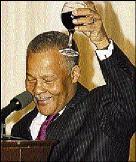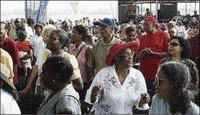
Robert Buddan, POLITICS OF OUR TIME Barbados holds elections on Tuesday. A country that studiously avoids controversy or publicising them while living as an island to itself, now finds that there are more than a few controversies leading up to these elections, many of which seem typical of Caribbean island democracies, and finding it more difficult to keep these to itself under the greater exposure of globalisation.
The ruling Barbados Labour Party (BLP) of Owen Arthur seeks a fourth consecutive term over the Democratic Labour Party (DLP) led by David Thompson. Public opinion polls have been favouring the BLP but the party is up against the mood for change that faces a party ruling for three or four terms.
But there are controversies too. One of the controversies of Barbados and Caribbean politics is about getting constitutions right. Few countries have reformed their independence constitution reform has been talked about for years in most.
Barbados wants to become a republic and the elections were originally expected to run concurrently with a referendum for a new constitution. In the end the referendum was postponed because the Government had not informed the Opposition of its intention to hold the referendum along with the elections and had not circulated copies of the new draft constitution.
Another controversy in Caribbean politics is whether election dates should be fixed. An independent candidate in Barbados complained that the election date of January 15 is unlawful because the Prime Minister had not allowed the 21 working days between announcing the elections and the election date, a period necessary to complete nomination and register and publish the voters' list, taking into account public holidays. Those who favour fixed election dates can cite the advantage of having no confusion over when election dates are set for and who has the authority to set them.

Arthur
PARTY SYSTEM
Barbados and Jamaica have the two most balanced two-party systems in the region. The BLP and DL regularly as have the PNP and JLP. Of the 11 elections contested between them since 1956, the BLP has won six and the DLP has taken five. However, both Jamaica and Barbados have recently gone through a period of one-party dominance, with the PNP dominating for 18 years between 1989 and 2007, and the BLP doing so for 13 years since 1994, and could stretch that to 18 years if it wins again. This has raised another kind of controversy - whether Barbados is heading towards a one-party dominant system and if this is good for its democracy.
Ruling parties in Jamaica and Barbados do seem to suffer the constraint of the tradition that limits parties to terms that do not go too far beyond two or three terms unless unusual circumstances prevail, such as a particularly well-organised and relevant government or a disunited opposition party. The greatest pressure facing the BLP is the opposition's campaign that it is time for a change. Government spokespersons have responded to insist on staying the course, reminiscent of the Jamaican elections.
The pressure for change is given substance by the inevitable scandals and controversies that accumulate over three or more terms and the intensification of the pressure for those who have been out of power to develop new and sometimes desperate means to win power.
At the same time, a certain anxiety develops among the population over whether the system is effectively developing towards becoming a single party system, and whether the Government is becoming arrogant or even dictatorial. Prime Minister Owen Arthur made matters worse with a controversial statement at his nomination saying, "I'm motivated in a special way by the determination to never see the DLP hold the reins of office in this country." His critics have used this as evidence of growing arrogance and dictatorship.
ISSUES OF GOVERNANCE
The opposition is campaigning on the claim that it is time for a change, adding accusations of corruption in government and the usual overstatements that every conceivable thing has gone wrong. One claim by critics is that government officials form companies on the side and then award contracts to their own companies, and that important contracts are sometimes awarded without tender.
A controversy exists in a reported case in Canada involving land fraud in Barbados that implicate local politicians. There is also suspicion of bribery of government and public sector officials in awarding a major foreign contract. However, there is little evidence that the opposition has any plans for integrity legislation, freedom of information legislation, campaign finance laws, or conflict of interest laws it has lately published plans to strengthen public integrity.
The need to modernise and democratise the political and governmental process in Caribbean politics is evident from Jamaica in the west to Barbados in the east. Jamaica has actually made more progress in such areas as public sector modernisation, integrity and freedom of information legislation. However, many Caribbean countries need to do more to modernise their constitutions, pass freedom of information legislation, and strengthen integrity in ways that remove conflicts of interests. In Barbados, for example, the budget management process needs more transparency.
A growing problem in the Caribbean is campaign financing. The BLP has insinuated that Taiwan is helping to fund the DLP's campaign the DLP has denied this, the need for transparency in campaign financing is as clear as it is in Jamaica, where small democracies are involved with rich and powerful states and multinational corporations known to offer bribes for strategic politics or to get access to markets.
criticism
The Arthur administration has had its fair share of criticism of political patronage as well. Patronage, it is claimed, has increased the size and expense of government, for instance, through more consultants hired to government agencies. The problem is not a simple one. Caribbean governments do not have the luxury of progressive private sectors and well-resourced non-governmental organisations. Governments have to be more involved in these societies than they have the capacity to be. They often have to build that capacity through strategic appointments and regulatory boards.
This, however, has implications for which family, business, and ethnic networks supply the appointees, and this can be a very sensitive matter in societies with our histories of race and class even when we prefer not to speak about them in these terms. In countries like Barbados and Jamaica one might argue that though parties change ruling classes don't, and so social and economic governance remains the same. This raises perennial and disturbing questions about the nature of 'democracy' and the real value of elections when the ruling class does not stand for elections.
The Opposition Leader, David Thompson, has yet to establish himself as a credible national leader, and leadership is one of the most important issues in the elections. Owen Arthur wants another term to make Barbados into a republic, to continue to build up the country's reserves, to maintain the successful social partnership, to solidify the CARICOM Single Market and Economy, and to press on with the development plan to make Barbados a developed country by 2020. Ultimately, the elections will decide which section of the political class joins the business class in achieving these goals.
 arthur
arthur
Barbadians are being asked to change course or stay on track with the incumbent Government, which has been in power for 13 years.- file
Robert Buddan lectures in the Department of Government, UWI, Mona campus. Email: Robert.Buddan@uwimona.edu.jm.

